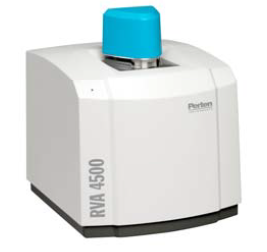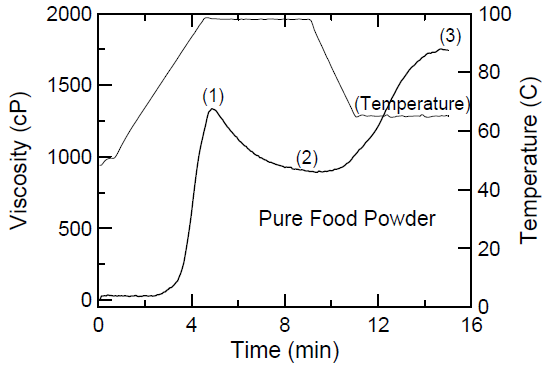The Rapid Visco Analyzer (RVA) is a cooking stirring viscometer that has been optimized for testing viscous properties. It features ramped temperature, variable shear profiles, a range of international standard methods and the flexibility to accommodate custom-made profiles.

Image Credit: PerkinElmer Food Safety and Quality
Its distinct combination of automation potential, speed, precision and flexibility makes the RVA suitable for applications involving quality and process control, quality assurance and product development.
The RVA is also ideally suited to the assessment of the cooked viscosity of unmodified dent corn starch, as well as the quality control of starch employed in the paper and food industries.
Description
This method can be used with unmodified dent corn starches. The final temperature of 65 °C (149 °F) is employed to rapidly stabilize viscosity while minimizing the risk of retrogradation.
Example

Figure 1. Pasting curve of unmodified corn starch using the ST-06 Method, showing the commonly measured parameters. Image Credit: PerkinElmer Food Safety and Quality
Table 1. Source: PerkinElmer Food Safety and Quality
| Analysis |
Starch Type All |
| (1) Peak viscosity (cP)* |
✓ |
| (2) Viscosity at 9.00 min (cP)* |
✓ |
| (3) Viscosity at end of test (cP)* |
✓ |
*Subtract viscosity at 0.50 minutes from value to give final result.
Method
A 15-minute pasting profile was used for this study.
Sample Preparation
Starch concentration (in distilled water) was selected based on appropriate starch viscosity values, as illustrated in the relative viscosity table below. The goal of this process was to reach an end viscosity of 800-1500 cP.
Table 2. Source: PerkinElmer Food Safety and Quality
Relative
Viscosity |
Starch Concentration
(dry solids, % w/w) |
Example of
Starch |
| Unmodified High |
8 |
Pure Food Powder |
Profile
Table 3. Source: PerkinElmer Food Safety and Quality
| Time |
Type |
Value |
| 00:00:00 |
Temp |
50 °C |
| 00:00:00 |
Speed |
960 rpm |
| 00:00:10 |
Speed |
160 rpm |
| 00:00:30 |
Temp |
50 °C |
| 00:04:30 |
Temp |
98 °C |
| 00:09:00 |
Temp |
98 °C |
| 00:11:00 |
Temp |
65 °C |
| 00:15:00 |
End |
|
Idle Temperature: 50 ± 1 °C
Time Between Readings: 4 s |
Measure
Measurements were conducted as follows:
- PV: Peak viscosity (cP)*
- V9: Viscosity at 9 minutes (cP)*
- FV: Final viscosity (cP)*
*Viscosity at 0.50 min should be subtracted from the value to obtain the final result.

This information has been sourced, reviewed and adapted from materials provided by PerkinElmer Food Safety and Quality.
For more information on this source, please visit PerkinElmer Food Safety and Quality.